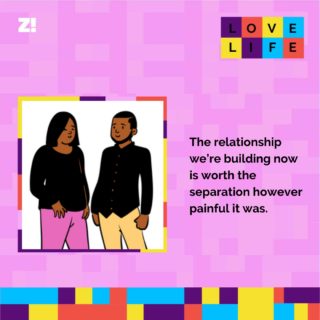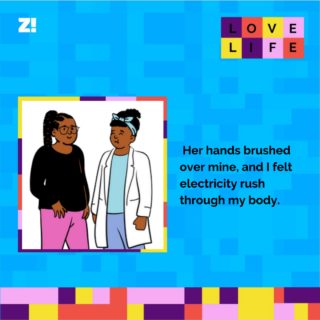In October 2016, I and my girlfriend at the time spent a week together at my house. We had not seen each other in three months so we spent most of our time indoors, catching up. We talked about the books we read in our time apart, about feminism and food. We washed and braided each other’s hair while listening to Asa blasting from my small Bluetooth speakers. I enjoyed spending time with her, but every night, after her bath, just before she went to bed, she’d always slip away to pray.
In the corner of my room, she’d sit facing the wall for some privacy between her and her God. She’d read through a devotional supplemented with her bible, then sing along to a Christian music playlist on her phone before kneeling to pray. I would remain on the other side of the room, ears listening, curious. Her prayers weren’t short like mine. It had layers and layers. She’d thank God for his goodness in her life and her family’s, then ask him for her heart’s desires. She also prayed for forgiveness of sins and interceded for those around her. Sometimes, I heard my name in these prayers. When I did, I would pause to acknowledge that God was possibly looking at me, watching me sin. It felt good though, to know someone other than my parents was praying for me. I never prayed past two minutes so I was in awe of how dedicated she was to worshipping a god she could not see.
On her third night with me, the prayers got intense — her voice was louder and she was speaking in tongues. She cried like she was in pain. The hair on my arms rose and goosebumps grew out of my skin. I would have left the room, but I wanted to be sure she was okay. I crushed the butt of my cigarette and tried to focus on the article I was reading but her words pushed their way into my ears with the same force they escaped her mouth. I did not realise that I was holding my breath until she stopped praying.
“Are you okay?” she asked, putting her bible and devotional away. I described how I felt to her and she recognised it as fear.
“You don’t know God, that’s why you’re scared of him.”
She was wrong — I did know God.
*
My parents grew up in Muslim households. They went to Arabic schools and fasted religiously during Ramadan. They were both raised to see Allah as supreme. Love brought them together in their twenties. When my mother noticed things were getting serious between them, she shared her biggest secret at the time with my dad — she was a Christian. She told him how her father caught her one day coming from charismatic lessons and warned her to never try it again. This did not kill her belief in Jesus Christ. She told my father that if he was serious about marrying her, he had to allow her to practise the religion of her heart. My father was baffled that it was even a problem. It’s a story she tells me with pride, a story about love and God’s plan. Their children would choose the religion they wanted, but along the line, that changed.
My siblings and I had Sunnahs, where rams were slaughtered to mark the seventh day of our births. We didn’t go to Arabic school, but I have vague memories of prayers in my early childhood being a repeated sequence of standing, sitting on my haunches, bowing with my forehead to the ground while mumbling words I didn’t understand — I was merely imitating my father. I remember watching him count his tesbiu and wondering when I would get mine. As I grew older, this was replaced with rides to St Paul’s Catholic Church, stuffed in the backseat with my landlord’s teenage daughters. We all wore long dresses with scarves, no arms and no legs.
At church, prayer was different. I understood what was being said, but the monotony of rituals remained. When the priest walked in with his flowing white gown and red scarf, we had to stand to acknowledge his presence. There was a lot of standing during the service. We also had communion, but only those with “grace” could receive it. Listening to the choir sing Amazing Grace sonorously soothed me, but I always wondered what it meant to be filled with grace.
After my sister’s Sunnah, she had her christening in a pentecostal church we eventually settled in. She was named “Faith” by the pastors, a name I refuse to regard as hers. Faith, the assurance of things hoped for, the conviction of things not seen — a concept that continues to evade me.
In this new church, the men of God did not wear gowns. They wore suits and spoke with authority. I could wear trousers, which I felt more comfortable in, to this holy house. During the first school holiday as a member of the church, my mum enrolled my siblings and I at the vacation bible school, where I met other kids in my age group. Together, we learnt about Abraham and God’s promise to him, Joseph and his coat of many colours, Moses and the Red sea, David and his psalms, Solomon and his God-given wisdom, and Jesus and his parables. I graduated second position in my class, and my mother bragged about it. The same way she bragged that her pastors were not miracle-obsessed like many pentecostal churches. A friend of hers would joke about how the members were nothing like their pastors though.
The members were nosy middle-class Nigerians who kept asking questions about my father. Was my mum married? Why didn’t he come to church? How do they cope? Do they fight about it? She answered them earnestly, “His rules were simple. No night vigils. No abandoning your family for church programmes.”
During Ramadan, she wakes up before 5 to prepare Sahur for him, and at night, she slices his favourite fruits into a bowl with which he breaks his fast. She makes elaborate meals to celebrate Eid with him. In 2010, they travelled together to Mecca. They both returned with gold teeth and new titles. She told her pastors before doing these things like she was seeking permission. As a child, my father would tell me that they served the same God, just with different names and modes of worship, but as I grew older, I began to doubt that.
One night just before I went off to boarding school, I saw Jesus. I had just finished dinner with my cousin and we were sitting together watching a popular pastor cast out demons from a member of his congregation on TV. The choir was singing in the background, asking the power of the Lord to come down. I remember wondering why we were not watching cartoons. The electricity current was low so the living room was dark save for the light from the TV screen. I was uncomfortable with the way the pastor pushed the little girl’s head around. Was the demon going to crawl out of her like in Nigerian movies? He covered her head with a white handkerchief and when she fell, I saw Jesus. A white man with gold streaked hair covering his face, dressed in all white, standing among the congregation just staring. He looked just like the painting of Jesus Christ in the Catholic church I grew up going to. I screamed and jumped into my cousin’s arms shivering. She kept asking what the problem was, but words failed me. Looking back, he was probably just a white man with long hair, but I had seen so many pictures and statues of Jesus that I was convinced that the man I saw on television had to be Jesus witnessing his servant do his good work. The incident bore my fear for Christianity. To today, whenever I hear, “Let the power of the Lord come down,” I fight the urge to run away.
When I was 8, I was sent to a Christian faith-based secondary school. It was founded by a well-known Pentecostal church. My mother thought it was the best option when compared to federal or missionary same-sex schools. My father had no objections. It was a mixed school but the boys and the girls did not see each other without supervision. We woke up every morning by 4:30, and after our baths, we went to church for an early service to set the day straight. We said a short prayer before breakfast, and afterwards, we had another quick bible service just before school started. The Gospel was integrated into everything we did. Each class started with prayers. After dinner, we had a prayer session just before prep class, which also ended with prayers. Then, we rinse and repeat. On Wednesdays, three of our classes were replaced with bible study, and after school, we ’d go to the main church for more bible study and prayers. On Fridays, we had a special service before dinner where the drama unit would stage a play. Saturdays were usually my best days because they were the most relaxed, but then, there was Sunday anxiety. Sundays came with a two-hour bible study before the main five-hour service. Every first Sunday of the month, we’d fast for the first few hours. It was torture considering that every first Saturday was visiting day. I could never get used to having too much to eat and not eating it. I’d start off fasting but before the service was over, I was already snacking on a chocolate bar I got the day before.
During most services, we were reminded of hell fire, that we would perish if we didn’t give our lives to Christ. I answered altar calls several times. As a born again, you are now covered with grace, no longer of the world. Telling lies, using cuss words and listening to worldly music was unacceptable. I fell out of grace every other day, but what bothered me the most was speaking in tongues. At bible school, I was taught that you had to be filled with the Holy Spirit to speak in tongues. I wanted to experience that.
One time, during evening service, the pastor asked those of us who had never been filled with the Holy Spirit to come forward with our hands outstretched in front of us. He pleaded with God to fill us with his spirit. After the prayers, he told us that all we had to do was speak. I spoke, but the tongues were stuck in my throat. I watched as my friends were kabashing and rolling on the ground in religious glee. When I asked my friend, she told me that she did not fully understand it herself. I wondered what they were doing right that I wasn’t. I refused to believe that God had skipped me, and I didn’t want to fake it. I worried about it until I attended my first deliverance service. People do absurd things when they catch the Holy Spirit. Some would prance around the room feverishly murmuring prayers. Others would freeze, fall to the ground shaking like they were convulsing. Sometimes, somebody would scream so loud I would still hear it in my head weeks after. To not be in control of my body is not an experience I want, so I decided being filled with the holy spirit wasn’t something I was okay with.
The older I grew, the more questions I had. I realised that I had never prayed anything into existence. In fact, most of the things I deliberately prayed for did not actualize, so I had to settle for God’s perfectly timed plan. I’ve never had a situation bend for me in that miraculous way that Christians talk about. Sometimes, I wished I could believe that because I did certain things, God would consider my desires over those who did not practice these same things.
That night, listening to my friend cry her eyes out, I hoped that he was listening to her and he would do as she wanted. When she lost her mother some months later, I wondered if it was part of his big plan. She kept believing though, and it scared me. Her unwavering belief made me think of faith as a superpower — something people like me, with questions where reverence should be, didn’t possess. Whenever I meet someone who is deep in their belief, I avoid them.
University was my chance to be free from religion. I spent my Sundays reading books or sleeping, recovering from all the strain I had been through over the years. I lived alone outside the university campus, so it was easy for me to not have anything to do with the church or the mosque. I was in awe of my friends who would wake up early by themselves, and dress up to go to church. If it was a new month, they would return with taglines from their pastors, uttering them at the slightest chance. The enthusiasm baffled me. Sometimes, they forced me to go to church with them. When I did, it was simply an excuse to socialize. A place to go before the main outing. While there, I had to caution myself to not scoff when the pastor was preaching. I reminded myself that even though the pastor may be interpreting the bible to fit his own narrative, I didn’t know enough to counter him. Eventually, I stopped entertaining any invites to church because it did nothing for me.
I have gone from believing in the possibility that God exists to questioning the reality of that chance. There’s a story of three blind men, my mum told me when I was a child. The men met an elephant on a walk, but because they were blind, they weren’t sure what was in their way. They used their hands to feel this strange thing. One of them said it felt smooth so it was fine wood. Another said it was rough like the bark of a tree, while the last one was convinced it was a tree because of the trunk he could feel. This story explains how I feel about religion today. I believe in the supernatural, that there are forces beyond us and that the ideas we have of these forces are incomplete. Thinking about that gap teaches me that every religion is valid because it’s conceptualised from the understanding each group has of God, like the three blind men.
My philosophy is that the world is too big — different people with their thought patterns influenced by their culture, religion and environment — to believe that there is only one way to do anything. Things happen beyond anyone’s control; wishes and prayers do nothing. I would rather hope that when something bad happens to me, I have the strength to move on from it than to entrust myself to any of the gods.




